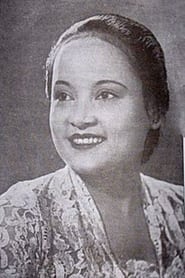 Ratna Asmara
Dataran Tinggi Minangkabau, Sumatera Barat
Ratna Asmara
Dataran Tinggi Minangkabau, Sumatera Barat

Ratna Asmara was an Indonesian actress and film director. Originally active in theatre, in 1940 she starred in the romance film Kartinah, which her first husband Andjar directed. After appearing in several further films, she made her directorial debut in 1950 with Sedap Malam (Sweetness of the Night), which made her the first female film director in Indonesian history. Although her work was generally ignored, later female Indonesian directors.
Ratna and her husband Andjar joined the Dardanella touring troupe in the early 1930s with the troupe she was known for the quality of her voice. In the late 1930s she joined Andjar with his Bollero troupe and became its star. She also acted for the Royal Balinese Dancers.
When Andjar was asked by The Teng Chun to direct a film for The's company Java Industrial Film (JIF), Ratna came with him. The couple earned 1,000 gulden each for their role in the resulting film, Kartinah (1940), Andjar as director and Ratna as its star. The film, a love story between the nurse Kartinah (played by Ratna) and her commander, was also the first war film in the country, taking place within the Air Raid Preparation teams (Luch Bischermen Diens). Ratna also appeared in Andjar's later directorial work, Noesa Penida (a love story set in Bali) and in Ratna Moetoe Manikam, a story about a love triangle between two goddesses and a mortal man. During the National Revolution following Indonesia's independence, Ratna appeared in one further film: Andjar's 1948 Djaoeh Dimata (Out of Sight).
In 1950, Ratna was commissioned by Djamaluddin Malik to direct the film Sedap Malam (Sweetness of the Night) for Malik's company Persari; Malik produced. Andjar wrote the screenplay. This made her the first female film director in the country. This was followed by two further films for the ethnic Chinese-owned Djakarta Film, both of which Andjar wrote: Musim Bunga di Selabintana (Spring in Selabintana) in 1951 and Dr Samsi in 1952. In 1953, Ratna established Ratna Films, which had a single production, Nelajan (The Fishermen), before being rebranded Asmara Films. This new company produced Dewi dan Pemilihan Umum (Dewi and the Election) in 1954, with Ratna as director; this coincided with the first legislative elections in 1955. Ratna left Indonesia for Italy to study film in 1954. She had died by 1981.
From Wikipedia, the free encyclopedia.






